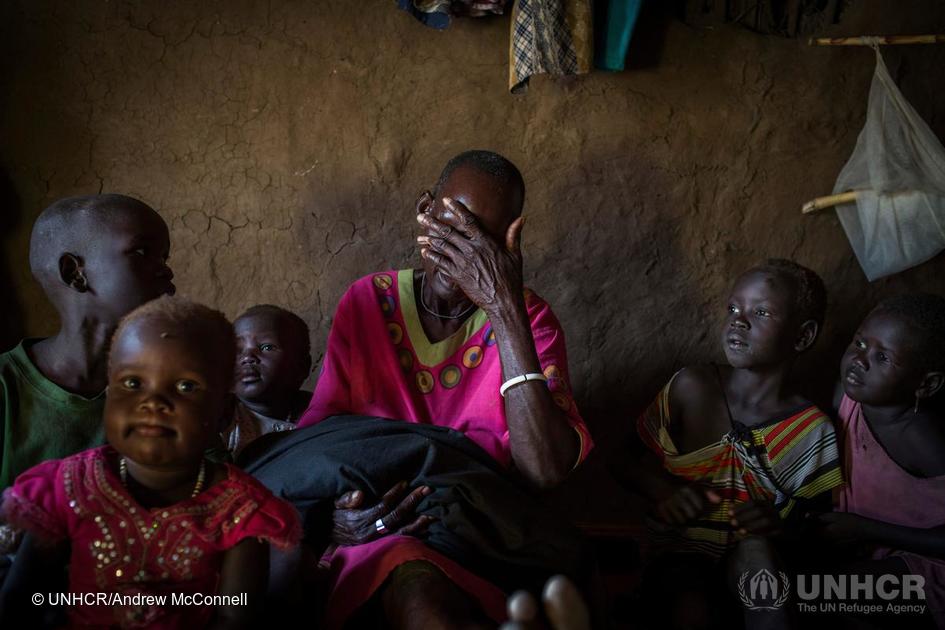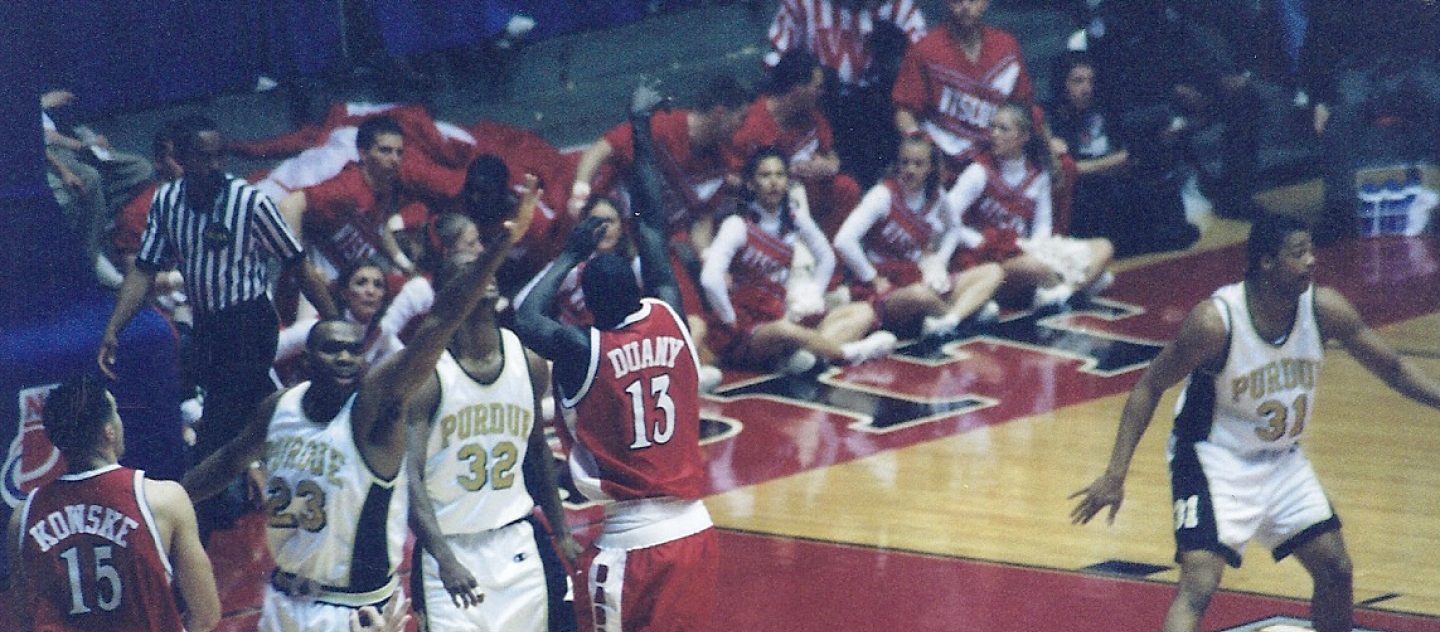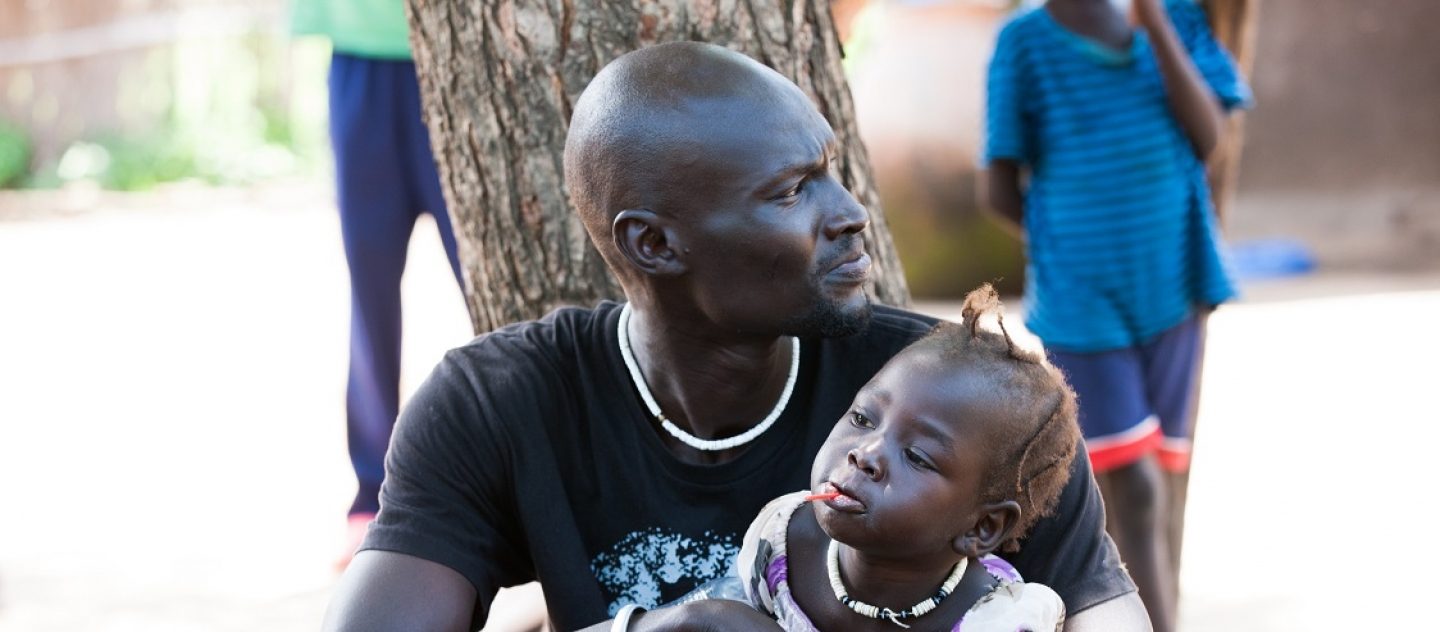GER DUANY: I was a Child Soldier
As an adolescent boy on the frontline and in refugee camps, I made choices that were motivated by a desire to survive. I could easily have died, many times. So many of us perished.
On 9 July 2011, as I watched the flag of South Sudan rise for the first time, a light came on inside me. It was Independence Day.
In that moment, all of the misfortunes of my childhood took on a powerful inspirational meaning. I remember feeling that if I had to die right then, I would do so with a smile. I had lived to see my country independent.
The new flag of South Sudan symbolized victory at the end of a long and bloody struggle, in which more people than we will ever know perished from guns and bombs, hunger and disease
I was in Juba, the capital, for the historic event. Television pictures showed grown men standing under the relentless sun unashamedly letting tears roll down their cheeks. The people of South Sudan had claimed their dignity and gained their independence through a landslide “yes” vote for separation from Sudan.
Our new flag symbolized victory at the end of a long and bloody struggle, in which more people than we will ever know perished from guns and bombs, hunger and disease. The weight of millions of sacrifices was lifted in that gesture of a flag rising. Never again the humiliation of being a second-class citizen, hounded out of our homes and scattered across the five continents as refugees.
![Ethiopia / South Sudanese Refugees / Gatluak, 11, is one of many boys making kalashnikovs out of mud at Lietchuor refugee camp in Ethiopia. Around 45,000 people have fled their homes in South Sudan to come to this dismal camp built on a floodplain in Ethiopia. The floodwaters have drained, but as the roads dry up, many boys like Gatluak dream of making their toy mud guns real and heading home to fight in an increasingly ethnic civil war that has already reeled in many young boys. "It only takes five minutes to make one of these. Yesterday I made three. It's an AK47. I like making guns because my people and the Dinka [ethnic group] are fighting and one day when I grow up I want to fight them too. I don't like it here, I like my country, but the one before the soldiers came and took it. I want to go back next month, but I'm too small now to be a soldier so I have to wait here for a few years" UNHCR / Catianne T./ November 2014](https://webarchive.archive.unhcr.org/20170109131956im_/http://www.unhcr.org/afr/wp-content/uploads/sites/5/2016/10/Gatluak-UNHCR-Ethiopia-Gambella-141126-Catianne_Tijerina-234_Resized-1-894x504.jpg)
This 11 year-old is among many boys making kalashnikovs out of mud in a refugee camp. “It only takes five minutes to make one of these. Yesterday I made three,” he says. “I like making guns. One day when I grow up I want to fight them too. I’m too small now to be a soldier.” [UNHCR/Catianne T./November 2014]
My mind flooded with memories of my life’s ordeals.
As a young child living in Itang refugee camp in Ethiopia, I was oblivious to the harsh realities of the violent quest for independence. I knew only that the northerners hated us, looked down on us and were bent on destroying us. War raged in our homelands in Sudan, and our stay in Itang stretched to four years.
Our leader, John Garang, often came to Itang. He would remind that we were part of the “Red Army” of young freedom fighters. We practiced marching drills every day, out of the sight of aid workers who were providing humanitarian assistance.
I remember the exploding sound of gunfire and people running in all directions screaming.
In Itang, I had my first experience of formal education. Our school was in a shade under a tree. We wrote our ABCs on the ground. I learned basic English and Arabic from wounded SPLA soldiers who were recuperating in the camp. They were young guys whose schooling had been interrupted by the war.
In May 1991 that episode of my life came to an abrupt end. Ethiopia’s president, Mengistu Haile Mariam was ousted. He had supported the Sudan People’s Liberation Army and our struggle for independence. The new regime had no interest in sheltering Sudanese refugees.
I don’t know how it started—whether Ethiopian government soldiers appeared, whether villagers attacked the camp, or whether something inside the camp sparked fighting. I remember clearly the exploding sound of gunfire and people running in all directions screaming. Rain fell and mixed with blood on the ground. I slipped as I ran, first to my stepmother’s house, and then to my mother’s. I found both empty.
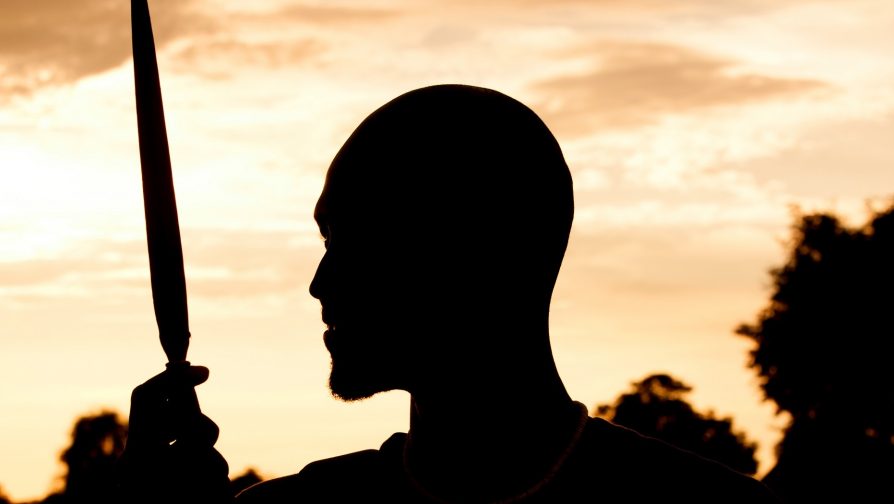
I visited Itang in 2014 after almost 23 years. I also found members of my family in the refugee camps of Gambella and heard horrendous first-hand accounts of what they endured when fleeing South Sudan. [Emmanuel Jambo, 2014]
Amid the shooting I ran and ran as fast as my legs would carry me.
I came to a river that was choked up with dead bodies. I joined those who crossed. We marched back to Sudan. I was thirteen years old.
Life back in Sudan was hellish compared to Itang. For food, there was little more than grass. I was alone, separated from my family and desperate to survive in violent chaos. The northern government seized the opportunity of Ethiopia’s change of heart, and was bombing SPLA-controlled areas.
Despite my young age, I had no hesitation in becoming a soldier.I cleaned guns and occasionally I fired them. I became inured to the carnage.
Even worse, the SPLA had split into rival factions that were attempting to eliminate each other. Anyone who resisted the will of either side was killed. There were no real civilians, only warriors. Everybody was armed. Everybody was at war. You always had to protect yourself from someone. Everyone seemed to be enraged.
So when I found an SPLA base that would take me, despite my young age, I had no hesitation in becoming a soldier.I cleaned guns and occasionally I fired them. I became inured to the carnage.
Then an attack in 1992 wiped out nearly everyone in our camp. The enemy had surrounded us. We fled towards the Nile. Many unaccustomed soldiers from Nuba Mountains drowned; the Nile can be treacherous. You came come up for air and they popped your head.
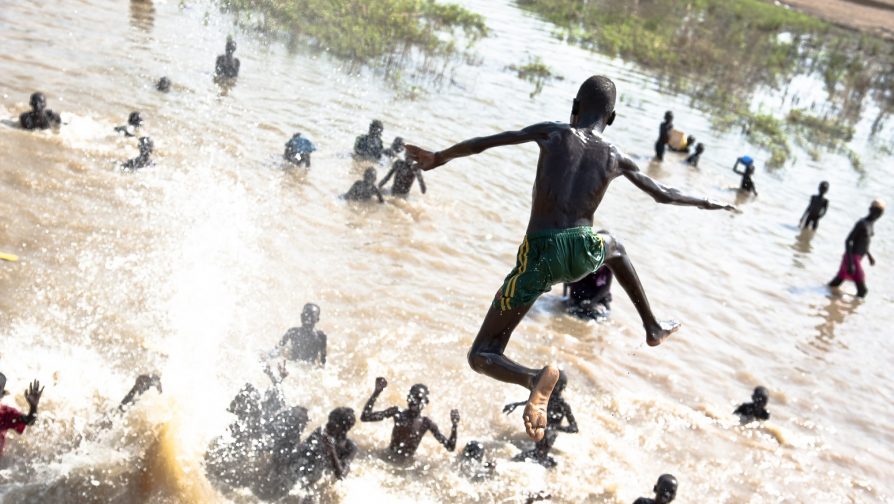
South Sudanese refugee children play in pools created by flood waters in Gambella, Ethiopia. [UNHCR/Catianne Tijerina, 2014]
After the fighting died down, we went back to the SPLA base in Nassir.
My close friends had all been killed. I did not have any direction after that battle.
I went back to Akobo to look for my mother. She had settled with my two sisters and two younger brothers in the beautiful small village of Deng Jok several miles from Akobo town. Our elder mother was also there with some of my siblings and my other young stepmother.
I could not take it anymore. I saw no future. I dropped my gun and crossed the Nile. I never looked back.
Death was still hounding me. Foreign aid workers and a South Sudanese man named Gatwech were transporting children across the river to take part in a vaccination campaign. My step mother and I stood on the bank, watching the motorboat speed off with about 30 children on board. My six-year-old twin sister and brother were among them. We watched in horror and disbelief as the boat capsized emptying the children into the water. My stepmother and I jumped in after the twins. We nearly drowned. The strong current carried everyone, including my baby sister, away and under. The other twin survived.
I could not take it anymore. I saw no future. I dropped my gun and crossed the Nile once again into Ethiopia. Alone I walked southwards in the direction of Kenya. I never looked back. I moved at night to avoid detection. On the way, I met up with other young guys. We walked for eight days without food and proper drinking water. Our feet swelled with cuts and bruises. My toenails came off.
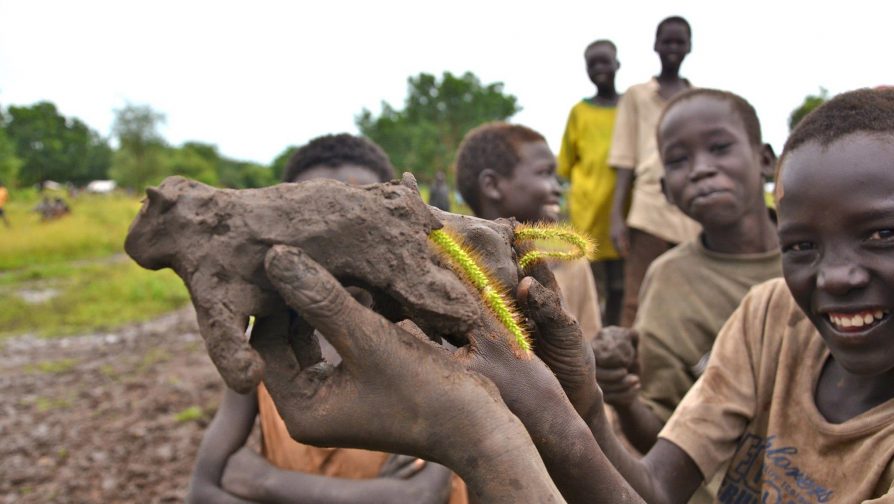
Refugee boys in Doro camp, South Sudan mold cows out of mud, like I did as a child back home in Akobo. [UNHCR/Teresa Ongaro, 2012]
We continued southwards, stealing and using the loot to bribe our way through. The end of the rainy season was approaching. We alternated days and nights of walking with rides that we bartered for anything we carried. We ate mangoes stolen from the villages we passed. They were raw and gave us stomach cramps. Hostile villagers threw rocks at us. We slept in the woods or on the long grass; anywhere we could find a dry space.
The landscape changed. We entered the Ethiopian Highlands. I had never been on a mountain. Sudan is flat. Temperatures dropped. The cold made us sick. All I had was a ripped-up t-shirt. We were scared. We didn’t know the forest, or the animals.
We decided to tackle the mountain at night. It was terrifying in the dark. We could not see. We tore our feet and limbs on thorns and sharp rocks. A monkey would scream. My heart would jump. We negotiated the unfamiliar terrain and made our way to the top. As the slope turned downward, we could not figure how slow our descent. We wound up rolling down the mountain. I would rather have walked for an entire month to avoid that mountain!

In Kakuma camp, Kenya with my mother and my brothers. My mother has experienced three civil wars, and been a refugee for most of her adult life. I was separated from her for 18 years, during which time she feared I had died. [Emmanuel Jambo, 2014]
Kenya was on the other side. We came to a refugee camp called Walda in the sprawling Dadaab complex. I recall seeing a food storage facility and thinking this had to be the place we had prayed for.
Walda camp had mostly Somali refugees. We were about 2,000 Sudanese. Within a few months of our arrival, tensions exploded between our two communities. People died on both sides. The only solution to the violence, it seemed, was for the United Nations to move the Sudanese refugees to Ifo camp, also in Dadaab. We immediately set about building a solid fence to protect ourselves. We cut down all the trees we could find, and bound the poles together to make an impenetrable fence. Behind it I felt safe.
The next two years were tough in 120-degree heat. Yet life was calm and peaceful. A number of resettlement agencies were working to take Sudanese refugees to the United States. I played soccer, ate one meal a day and waited. My chance came in 1994. I was 15 years old.

